News
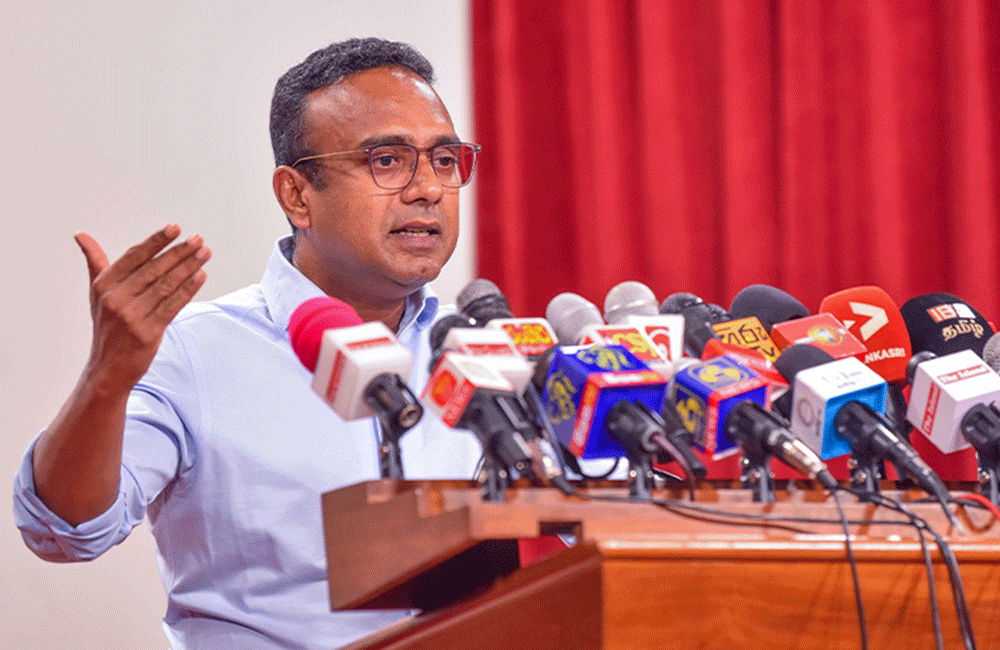
Social Security Benefit Introduced for All Workers Over 55
Labour and Foreign Employment Minister Manusha Nanayakkara announced that the Cabinet has approved a proposal to provide social security benefits to all workers aged 55 and above across various industries. This initiative includes the preparation of necessary legal provisions, which will be developed alongside the “Garusaru” program.
Addressing the press briefing titled “Collective Path to a Stable Country” held at the President Media Centre (PMC) today (28), Minister Nanayakkara highlighted the government’s commitment to social security and labor rights.
The Minister further responded to criticisms about the lack of mental freedom to celebrate festivals, noting that the current government, led by President Ranil Wickremesinghe, has restored the environment for celebrating Vesak, Poson, Esala and Christmas.
He challenged critics to present a proper economic plan, emphasizing that the government is actively implementing programs like Aswasuma and Urumaya to provide relief to the people.
Minister Nanayakkara also highlighted significant economic and legal reforms under President Wickremesinghe’s leadership, such as reducing bank interest rates from around 25% to between 12% and 8%, amending the Anti-Corruption Act, the Election Expenses Regulation Act, and the Assets Liabilities Act, and introducing bills on economic transformation and public finance management.
Furthermore, the government has addressed the wages of plantation workers, with a commitment to take back government estates from employers unable to meet the announced salaries and lease them to capable parties. The President has secured Cabinet approval to enact a law to facilitate this process.
Moreover, the cabinet has approved a proposal to provide social security benefits to all workers aged 55 and above, across various industries. The preparation of the legal provisions for this initiative, which is being planned in conjunction with the “Garusaru” work program, has already begun.
Additionally, our government has paid special attention to the wages of plantation workers. Employers who struggle to pay the government-mandated salaries will have their rented government estates reclaimed. These reclaimed estates will then be leased on a long-term basis to parties capable of managing them effectively. The President has secured Cabinet approval to draft a law to facilitate this process.
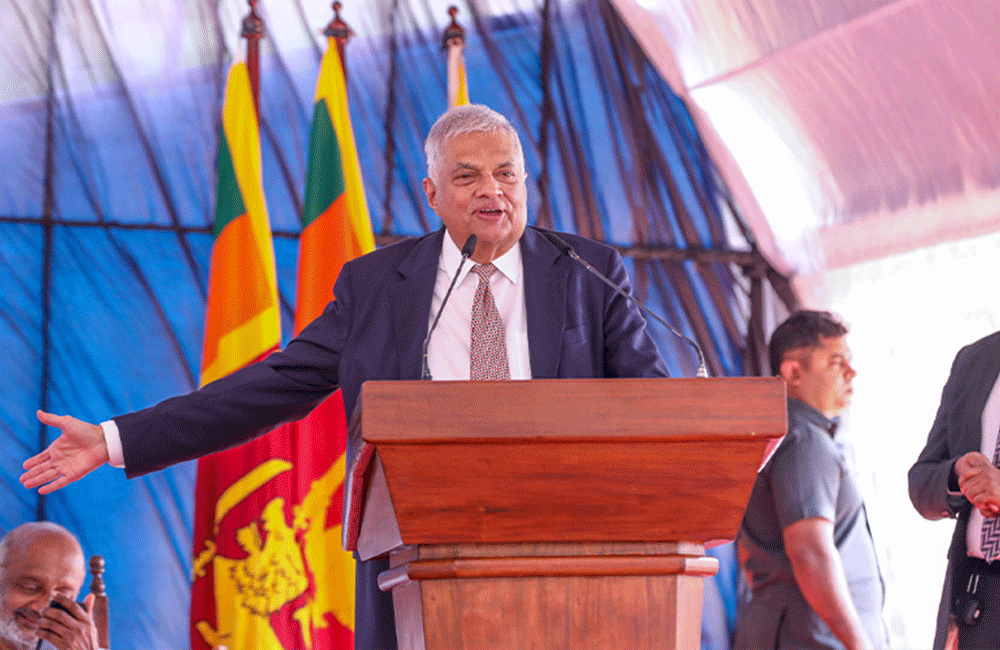
The President inaugurates the Centre of Excellence for Women’s Health Services at the Kilinochchi District General Hospital
President Ranil Wickremesinghe inaugurated the Centre of Excellence for Women’s Healthcare at the Kilinochchi District General Hospital. The facility, constructed with funding of LKR 5,320 million from the Government of the Netherlands, under the government’s initiative to enhance healthcare infrastructure nationwide, was officially inaugurated by the President, this morning (25).
Established in 2006, the Kilinochchi District General Hospital serves as the primary healthcare facility in the district, catering to the medical needs of over 150,000 residents.
The inauguration of the Centre of Excellence for Women’s Health Services today marks a significant advancement in maternal and Neonatal care in the North. This initiative is poised to enhance the healthcare system in the Northern Province by addressing the needs of women and new-borns, as well as their families.
During the ceremony, the President unveiled the plaque and officially opened the Centre, while also taking the opportunity to observe its activities first-hand.
President Ranil Wickremesinghe, addressing the gathering, reflected on the journey of the project initiated in 2017 under the good governance government. Despite facing challenges such as the COVID 19 epidemic and economic crisis, he expressed joy in witnessing its successful completion and delivery to women.
Highlighting the government’s commitment to safeguarding women’s rights, the President announced plans to establish a dedicated commission to enforce legal measures aimed at empowering women. He further assured the passing of the gender equality bill before the end of June, expressing hope for unanimous support from Parliamentarians.
Speaking at further President Ranil Wickremesinghe stated,
“Although initiated in 2017, the completion of the Centre of Excellence for Women’s Health Services was hindered by challenges stemming from the COVID 19 epidemic and economic constraints. Nonetheless, I am pleased to announce its successful culmination and dedication to women today.
Moreover, notable progress is evident in Kilinochchi. Plans are underway to foster development, including the establishment of an investment zone in the Mankulam area. Additionally, the region presents opportunities for renewable energy projects, with approvals granted for such initiatives in Kilinochchi.
Efforts have been directed towards resolving land disputes and addressing the issue of missing persons in these areas.
The inauguration of the Centre of Excellence for Women’s Health Services signifies a significant milestone in serving the women of our nation. We have implemented various special measures to empower women, reaffirming our commitment to their well-being.
In our country, there has been a notable absence of laws safeguarding women’s rights beyond the basic provisions outlined in the Constitution. To address this gap, we have introduced two new drafts to Parliament aimed at enhancing women’s rights.
The Women’s Empowerment Act proposes essential provisions to legally empower women, including the establishment of a dedicated commission for their implementation. Furthermore, we aim to pass the gender draft by the end of June, currently undergoing review by the courts before submission to Parliament, with anticipation for unanimous support.
Our commitment to protecting women’s rights extends to enacting laws against violence and ensuring equal opportunities for women in workplace promotions and transfers. We anticipate the formal legalization of women’s rights and pledge to operate within this framework.
Additionally, we prioritize the safety of women within their homes. These proposed women’s rights bills are readily accessible on our website, and we encourage everyone to familiarize themselves with them. Furthermore, we plan to launch a specialized educational program to raise awareness about women’s rights and empower them accordingly.
Fisheries Minister Douglas Devananda,
The newly opened buildings in Kilinochchi today and Jaffna yesterday are poised to deliver exceptional services to the public. On behalf of the people of the Northern Province, I extend sincere gratitude to President Ranil Wickremesinghe for providing these essential facilities.
Additionally, the President entrusted me with the task of presenting a proposal to elevate Jaffna Hospital to a national level in the upcoming Cabinet meeting. Had the Tamil people extended their support to him during the 2005 presidential election, they would have experienced substantial benefits.
During the recent economic crisis, President Wickremesinghe demonstrated leadership by swiftly addressing issues such as long queues, shortages of goods, and fuel scarcity. If we continue to support him and work alongside him, we have the potential to propel our country forward.
Northern Province Governor P.S.M. Charles,
Citizens have been waiting in long queues for gas and other essential goods, and tragically, some have died while doing so. They have collapsed, and many were admitted to hospitals. For Sri Lankans living abroad, hearing this news was shocking. Many of our relatives and friends reached out to ask about our well-being, given the dire situation in the country.
Today, we have forgotten that past and are fighting to increase salaries and employment opportunities.
We need a leader for this country who is globally recognized and accepted. The current economic crisis cannot be resolved solely through internal efforts; it requires international collaboration. Our current leader, despite not having a majority in Parliament, has managed to guide the country through this crisis due to his global acceptance and leadership qualities.
Member of Parliament M.A. Sumanthiran,
Yesterday, the President announced in Jaffna that efforts will be taken to upgrade the Jaffna Teaching Hospital to a national hospital. We welcome this because, in any case, a teaching hospital comes under the central government. However, as we are intent and keen on the devolution of power in a very meaningful way, we are conscious that health and education are two areas where governmental power must be fully devolved.
Healthcare is fundamental to the survival of any community, and as we inaugurate this building in Kilinochchi today, we sincerely thank all those who have contributed in immeasurable ways to make this a reality and a success.
Member of Parliament Dharmalingam Siddharthan,
I am pleased to inaugurate this special facility for women, made possible through funding from the Dutch government. This project stands as a testament to its exceptional quality.
I express gratitude to President Ranil Wickremesinghe for his steadfast commitment to these initiatives, both during his tenure as Prime Minister and in his current role as President.
Ambassador of the Netherlands to Sri Lanka Bonnie Horbach,
It brings me great joy to inaugurate the Centre of Excellence for Women’s Health Services at the Kilinochchi District General Hospital. This project stands as a testament to the fruitful collaboration between the VAMED organization in the Netherlands and the Ministry of Health of Sri Lanka.
Established on June 12, 2018, this partnership aimed to develop four cutting-edge hospitals in the northern and eastern provinces of Sri Lanka. To facilitate this endeavour, 75% of the estimated project cost was provided as a concessional loan by the Dutch government, with the remaining 25% granted by the same. Notably, in response to the subsequent challenges posed by the COVID-19 pandemic and the economic downturn in Sri Lanka in 2022, the Dutch government increased its grant to 35% of the total project cost.
The event was attended by religious leaders, former State Minister Vijayakala Maheswaran, local politicians, government officials, members of the local community and various other individuals.
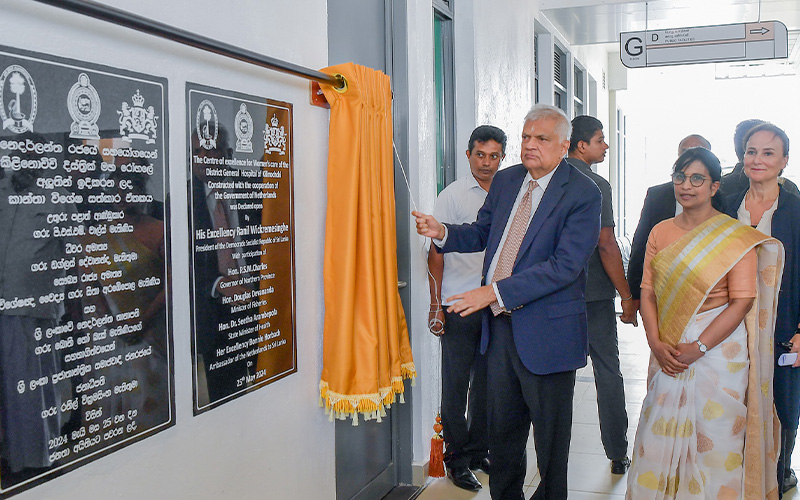
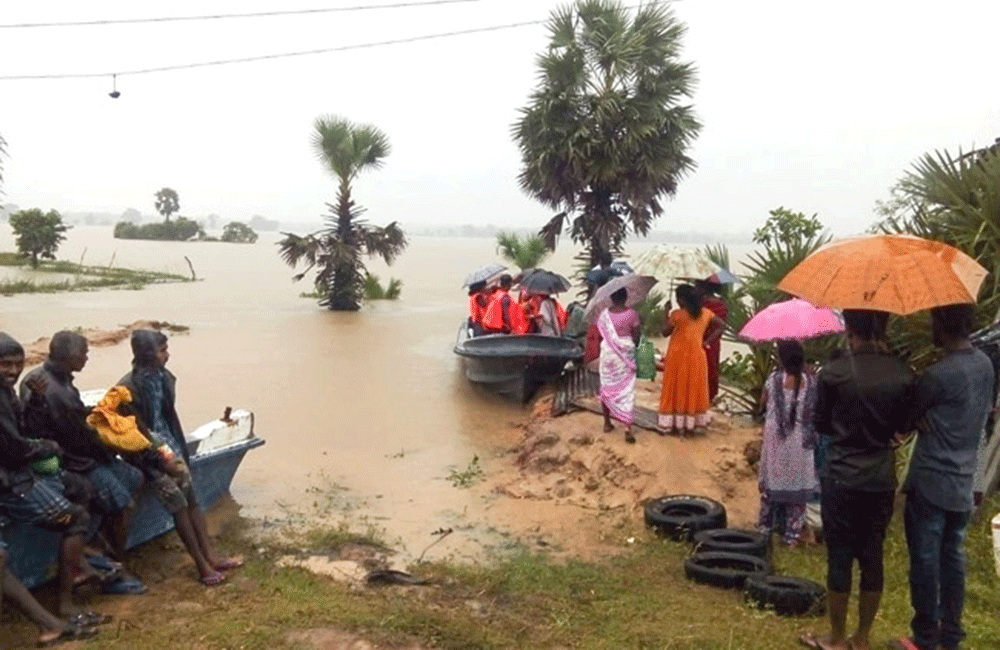
President Orders Ongoing Relief for Those Affected by Adverse Weather
President Ranil Wickremesinghe instructed officials to provide immediate relief to those affected by the recent inclement weather and to continue these efforts until the situation improves.
According to the Disaster Management Centre (DMC), eight deaths have been reported across the island as of yesterday (27). Seven people died in accidents caused by strong winds, and one person died in a boat capsizing.
The President also directed that compensation be provided to the families of the deceased. The Disaster Management Centre will provide Rs. 250,000 for each victim, with an advance payment of Rs. 25,000 already arranged.
As of yesterday (27), 42,640 people belonging to 11,326 families have been affected by the inclement weather.
The President instructed the Disaster Management Centre to ensure all necessary facilities are provided, with special attention to health and hygiene.
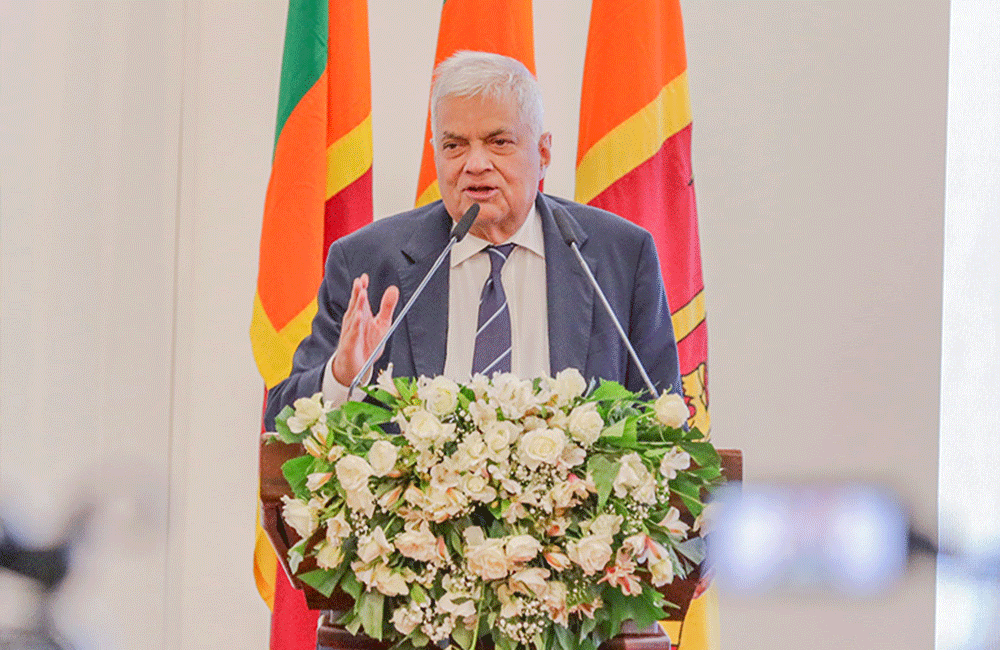
Jaffna Hospital would be upgraded as a national hospital in the near future
President Ranil Wickremesinghe stated that the Jaffna Hospital would be upgraded as a national hospital in the near future to enhance and ensure excellent healthcare standards in the Northern Province.
He further noted that the Cabinet has given its approval for the Karapitiya Hospital to be upgraded as a national hospital.
These remarks were made during President Wickremesinghe’s attendance at the inauguration of the Clinical Training and Research Block at the Faculty of Medicine, University of Jaffna, today (24).
Chairman of the University Grants Commission, Prof. Sampath Amaratunga, emphasized the need for modernizing technology across all science-based faculties in the country, including engineering, medical, science, and agriculture faculties. He highlighted that the current out dated technology hinders progress and adaptation to the modern world.
Furthermore, he noted that Sri Lankan children studying abroad excel not because of the technology they use but because of their knowledge. He emphasized that the integration of new technology could significantly propel the country forward.
In response, the President instructed the Ministry of Science and Technology and the Ministry of Education to collaborate on drafting a proposal for modernizing technology in these faculties and present it for his consideration.
Furthermore, the President highlighted significant developments in the region, notably the construction of the Clinical Training and Research Department building at the Jaffna University—the first such structure to be built in 46 years. With an investment of LKR 942 million, this facility will accommodate 1200 students for undergraduate and postgraduate clinical training, fostering international research collaborations.
The building, spanning 6000 square meters, comprises multiple lecture halls, clinical skills laboratories and an auditorium. Additionally, it features essential medical facilities such as operating theatres, recovery rooms, cleaning and disposal areas, sterilization units, preparation rooms and storage facilities.
Furthermore, the building houses patient waiting rooms, consultation rooms, and specialized units dedicated to endoscopy, vascular surgery, and mammography. It also accommodates research laboratories, a forensic investigation unit, and a museum for educational purposes.
Under the management of the Department of Obstetrics and Gynaecology, supported by the Department of Surgery, and other consultants from the teaching Hospital Jaffna, the Fertility Care Unit is set to offer a wide range of services, encompassing specialist consultations, diagnostic procedures, and treatment facilities.
Meanwhile, the Clinical Trials Unit (CTU) will facilitate clinical research on locally adapted patient-oriented, and cost-effective treatment methods. Additionally, the Clinical Genetics Unit (CGU) will aid in genetic cost-effectiveness, disease management, and preventive measures.
Following the unveiling of the plaque and the inauguration of the new building, the President proceeded to embark on an inspection tour.
The President addressing the gathering further stated:
“Your request for the establishment of a national hospital in Jaffna has been duly noted. Coincidentally, I have been contemplating the same. Just last week, the Cabinet approved the upgrade of Karapitiya Hospital, and next hospital to be upgraded as a national hospital is going to be Jaffna Hospital.
It is imperative for Jaffna to have an excellent healthcare system, ensuring equitable access to quality healthcare services not only in Colombo and the southern regions but also in the north and central areas. However, our efforts should not stop there. We must also turn our attention to the broader developmental needs of the region.
Regarding my frequent visits to Jaffna, allow me to clarify the purpose behind my recent visit. Despite it coinciding with a long weekend, I felt compelled to address pending matters, particularly the inauguration of two hospitals as requested by both the local community and the Ambassador for the Netherlands during my previous visit.
I have made it a point to visit Jaffna regularly, both as Prime Minister and President, recognizing the pressing need to address the longstanding issues stemming from the conflict in the north and east. The time has come to shift our focus towards development. There are people here without who are looking for jobs and the potential for Jaffna for development is great, to use that term. Jaffna, which has seen limited development in recent years, holds immense potential for growth.
While I may not delve into all the issues at hand today, it is evident that progress has been made in addressing certain challenges, such as land-related issues. However, there remain unresolved matters concerning detainees and other related issues that require our attention. But we still have, to bring this to a close and that revolves around the remaining political issues.
Moving forward, we must prioritize reconciliation efforts, address concerns regarding missing persons, and devise mechanisms for compensation and truth and reconciliation. I think this is the time now we have to deal with all these issues.
These are complex issues that demand collective cooperation and engagement from all stakeholders. I have discussed this with the members of Parliament from North and the East, as to what measures we need to take.
Amidst economic challenges, we’ve been unable to allocate significant funds in recent years. However, we must earmark resources for truth and reconciliation efforts. The government is committed to establishing the Truth and Reconciliation Commission (TRC), but we must address the critical issue of judicial powers.
We’re deliberating whether the TRC should wield judicial authority or if a separate court should be empowered based on TRC recommendations. This decision is paramount, and I’ve tasked relevant ministers, in consultation with parliamentarians and ambassadors, to draft legislation for parliamentary review.
Moreover, Jaffna holds immense developmental promise, particularly in renewable energy, agriculture, and industries. Harnessing solar and wind power capacities could position Jaffna as a major energy hub. This is the biggest and we have not yet tapped, I mean the potential for the north is not in terms of megawatts but in terms of gigawatts. Additionally, agricultural modernization and industrial zoning initiatives aim to elevate economic prospects in the region.
We aim to cultivate a competitive, high-value export-oriented agriculture sector nationwide, with the Northern Province playing a pivotal role. The province’s farmers possess the requisite skills for this endeavour, which promises to significantly enhance both individual and provincial incomes.
In the realm of industry, discussions are underway to establish the inaugural investment zone in Kankasanthurai, followed by industrial parks in Paranthan and Mankulam. Collaborative efforts with India are also underway to develop Trincomalee.
Furthermore, we’re exploring tourism prospects in the north, anticipating transformative changes with forthcoming land connectivity, particularly benefiting Jaffna.
These initiatives hold the potential to position the Northern Province as a key economic hub of Sri Lanka.
During our visit, we witnessed captivating dance performances by students from the Faculty of Medicine at the University of Jaffna, most of who are under 21 years of age, born in 2002 or 2003.
These individuals belong to Generation Z and are deeply invested in shaping their own futures. It’s incumbent upon us to facilitate their aspirations, which underscores our legislative efforts aimed at propelling rapid development within a new economic paradigm”.
Minister Douglas Devananda:
“For over a decade, since 2003, the Jaffna University Faculty of Medicine Students’ Union has tirelessly advocated for the construction of this building. Today, we stand here witnessing the fulfilment of that long-standing request. Furthermore, swift actions have been taken to address other pressing needs, including those of the Faculty of Agriculture.
During a critical period when the nation grappled with unrest, it was President Ranil Wickremesinghe who stepped forward to assume leadership, demonstrating unparalleled commitment. Today, we witness a multitude of developmental endeavours underway across the country.
President Ranil Wickremesinghe, with his visionary leadership, has transformed a non-functional vehicle into a vehicle fit for travel, symbolizing his capability to navigate the challenges ahead. His unwavering dedication inspires confidence, as evidenced by his track record of tangible achievements.
Member of Parliament Mr. Dharmalingam Siddharthan:
“In a remarkably short span of two years since assuming office, President Ranil Wickremesinghe has spearheaded numerous initiatives for the advancement of the Northern Province. The inauguration of this building for the Faculty of Medicine at the University of Jaffna is yet another testament to his commitment to Northern development.
His decisive actions, particularly concerning sensitive issues like the release of lands, reflect his deep concern for the welfare of the northern population. Even as the Prime Minister, he played a pivotal role in driving development efforts in both the northern and eastern provinces.
Member of Parliament Mr. M. A. Sumanthiran, PC:
“Hon. President, I extend my sincere gratitude for granting me the opportunity to address this esteemed gathering on behalf of the people of Jaffna. I also personally thank you for gracing us with your presence here today.
President Ranil Wickremesinghe has exhibited an unwavering commitment to the progress of not only the North but also the East, dating back to his tenure as Prime Minister. The inauguration of the Faculty of Medicine building at the Jaffna University is a milestone event transpiring today and underscores not just an investment in the North but also a significant contribution to the nation’s advancement. I firmly believe that this institution will evolve into a hub for scientific innovation in Sri Lanka’s future.
As emphasized by previous speakers in this event, the President has accorded special consideration to the development of the Jaffna district and its residents. It is possible that challenges in the North may have impeded your journey in 2005, a fact that I believe is now regretfully acknowledged by the people of the region.
I extend my heartfelt congratulations to the Faculty of Medicine at the University of Jaffna for realizing this monumental project. The dividends of this investment are bound to be substantial. We extend a warm welcome to the President for gracing the Jaffna district with his presence, and we commend him for his dedicated efforts in advancing the interests of the North during this visit.”
Governor of the Northern Province Mrs. P. S. M. Charles:
“It is with immense pride that I announce the completion of the Clinical Training and Research Department of the Faculty of Medicine at the University of Jaffna, marking a significant milestone after 46 years.
In March of last year, I requested the President’s presence for the inauguration of this building. He assured me of his attendance in May, and true to his word, he is here with us today.
In attendance were esteemed dignitaries, including Secretary of the Ministry of Education Thilaka Jayasundara, Chairman of the University Grants Commission Senior Professor Sampath Amaratunga, Dean of the Faculty of Medicine of the University of Jaffna Professor Rajendra Surendrakumaran, and former Member of Parliament Vijayakala Maheswaran.
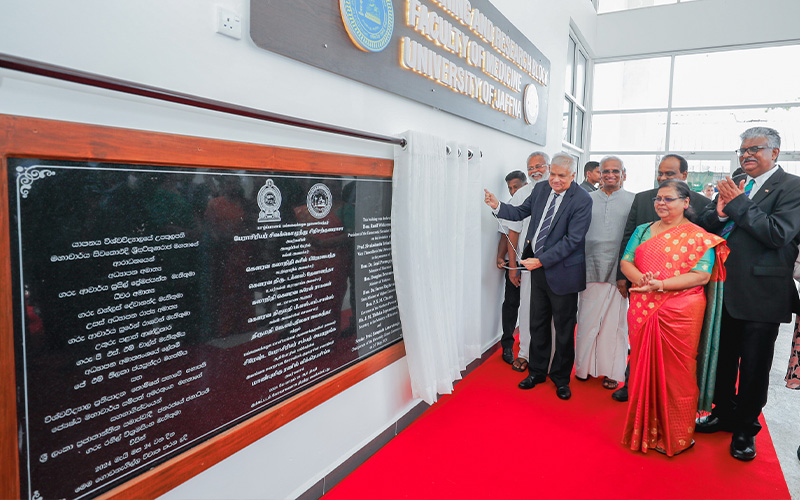
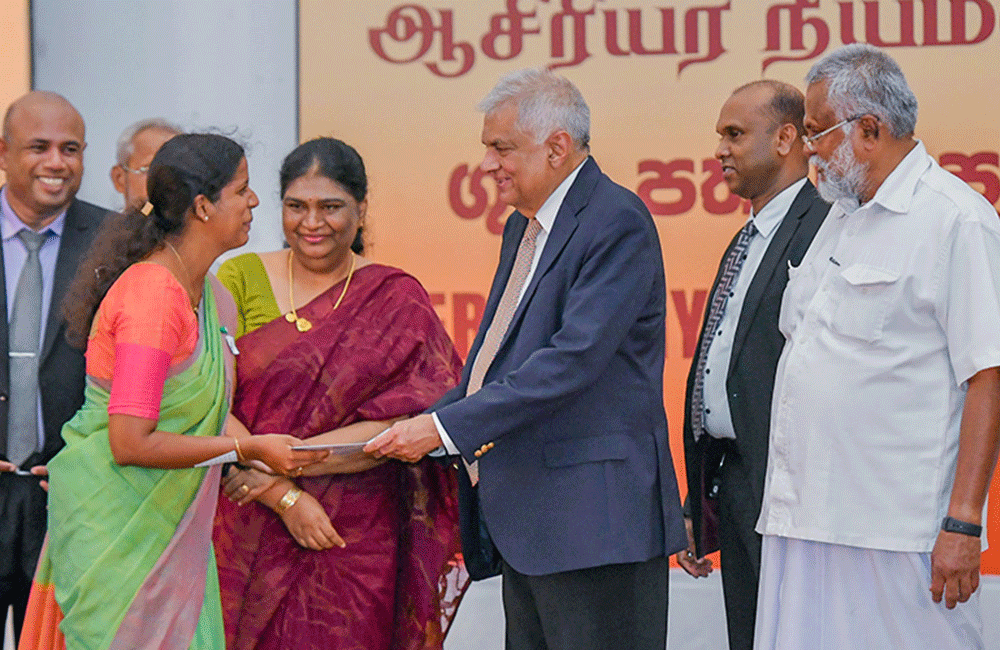
Teaching appointments to 375 teachers in the Jaffna District
President Ranil Wickremesinghe praised the historical “Jaffna Teaching Tradition” during a speech at the Jaffna District Teacher Appointment Ceremony yesterday (25). He highlighted the importance of restoring this tradition and emphasized the need for teachers to serve as exemplary figures in society.
He cautioned against teachers engaging in protests that may undermine their professional image and urged them to uphold their dignity.
The ceremony, which took place at the Jaffna Thanthai Selva Auditorium, saw the appointment of 375 teachers in the Northern Province.
Governor of the Northern Province Mrs. P.S.M. Mrs. Charles also presented a commemorative gift to President Wickremesinghe during the event.
Addressing the ceremony President Ranil Wickremesinghe further said;
“To all of you receiving teacher appointments today, you are embarking on a significant responsibility. You are entrusted with shaping the future of children within classrooms comprising 35-40 students. The trajectory of these children’s lives is heavily influenced by your guidance. Failure to uphold this responsibility renders one unsuitable for the teaching profession.
Jaffna teachers have historically been in demand both nationally and internationally. They have demonstrated unwavering commitment to fulfilling their duties. Even at prestigious institutions like Royal College, Colombo, where I myself received my education, Jaffna teachers were recognized for their exceptional dedication. Their legacy continues to resonate in society, underscoring their exemplary practices that serve as a benchmark for educators nationwide.
The development of Jaffna owes much to its steadfast commitment to education, with certain schools garnering global renown. For instance, Hartley College students have showcased their talents on prestigious platforms like Oxford University, underscoring the calibre of education in the region.
I urge you to embrace this noble profession with the same fervour and dedication. Joining the ranks of Jaffna’s esteemed educators is not merely a career choice but a commitment to shaping lives and contributing to the broader landscape of education.
As educators, it is imperative that you serve as exemplary figures within the teaching profession. Engaging in public demonstrations or shouting slogans on the streets may compromise your credibility in the eyes of students. Therefore, it is essential that you fulfill your responsibilities with diligence and professionalism.
Reflecting on the past, Jaffna boasted a commendable school system. Notably, former speaker Mr. K.B. Ratnayake received his education at Hartley College, exemplifying the quality of education prevalent at the time. However, the onset of war led to the departure of many teachers, resulting in a decline in the standards of education within the region. It is incumbent upon us to strive towards reinstating Jaffna’s education system to its former glory and beyond, aiming for international standards of excellence.
I propose that the governor engage in comprehensive consultations with all relevant stakeholders, including representatives from northern councils and universities, to devise a plan aimed at restoring Jaffna’s school system to its former international standards. It is imperative to recognize that providing education solely in Tamil and Sinhala is insufficient; English proficiency must also be prioritized for children. To achieve this, the recruitment of qualified teachers is essential. Although this endeavour may span a period of 10-15 years, proactive measures must commence without delay.
On behalf of those appointed today, I extend my heartfelt congratulations and urge them to wholeheartedly dedicate themselves to the noble task of serving the children of the north while upholding the dignity of the teaching profession.”
In attendance at this event were Minister Douglas Devananda, Members of Parliament Dharmalingam Siddharthan, M.A. Sumanthiran, Charles Nirmalanathan, and Kulasingham Dileepan. Also present were Northern Province Governor Mrs. P.S.M. Charles, Chairman of the Northern Provincial Council C.V.K. Sivagnanam, former State Minister Mrs. Vijayakala Maheswaran, political representatives from the province, and officials from the Northern Province, including the Northern Province Provincial Education Secretary.
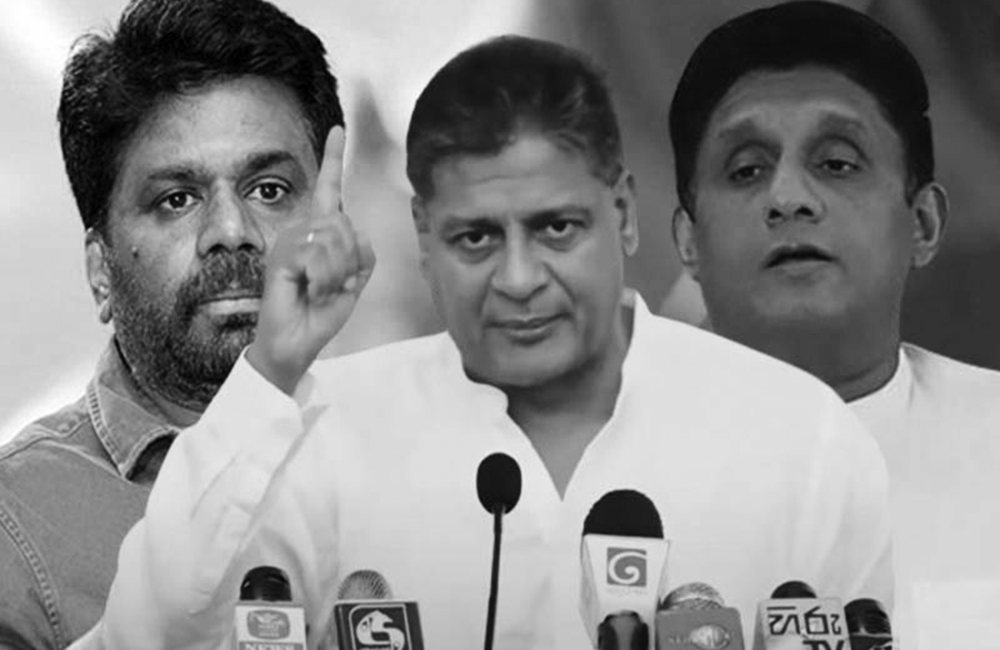
Dilith offers to replace Sajith in debate with AKD
The leader of the Mawbima Janatha Party (MJP) Dilith Jayaweera has claimed opposition leader Sajith Premadasa would not take part in the proposed debate with National People's Power (NPP) chief Anura Kumara Disssanayake on 06 June and offered to replace him.
In that debate, Jayaweera said he was prepared to answer any question to be raised by Dissanayake. He assured him that he would not raise his clothing, business class travels or the personal life.
Jayaweera was speaking at a republican day celebration at Light House on 22 May.
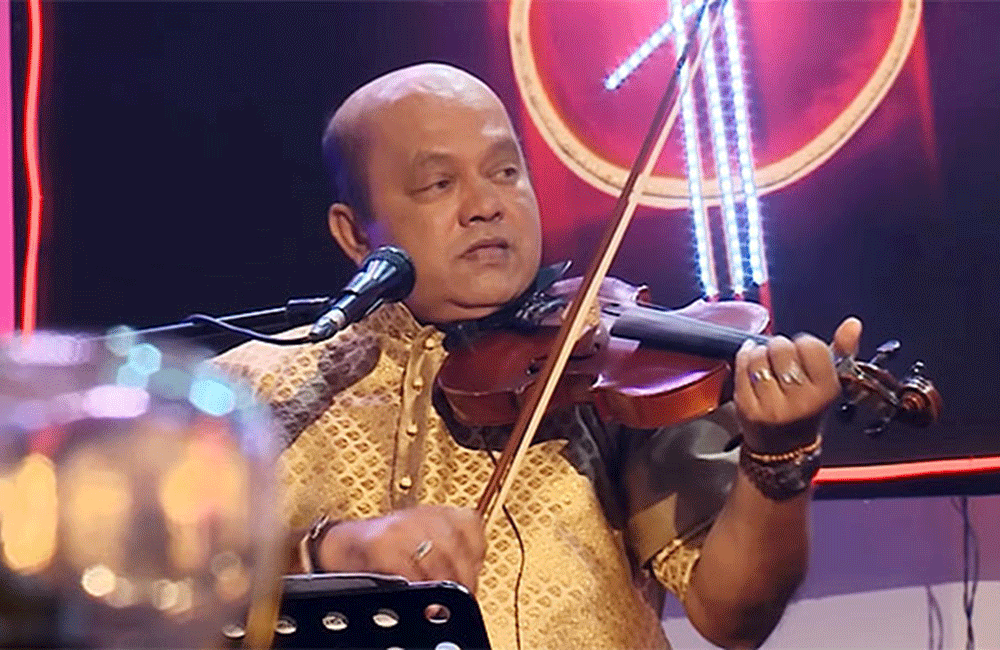
Veteran musician Ananda Perera passes away
Veteran singer and musician Ananda Perera has passed away at the age of 67.
He had passed away while receiving treatment at a hospital in Kandy, family sources confirmed.

President Participates in Multiple Vesak Celebrations in Colombo
Published on: May 24, 2024 President Participates in Multiple Vesak Celebrations in Colombo President Ranil Wickremesinghe participated in various Vesak programs held in Colombo yesterday (23) as the nation celebrated Vesak.
The ‘Buddha Rashmi’ Vesak Zone, organized by the Hunupitiya Gangarama Temple, was inaugurated under the patronage of President Wickremesinghe, yesterday.
The President arrived at the Gangarama Temple, where he offered flowers to the Buddha statue and participated in religious rituals. Ven. Dr. Kirinde Assaji Thero, the Viharadhikari of the Gangaramaya Maha Viharaya, conducted the religious ceremonies and bestowed blessings upon the President.
Subsequently, the President inaugurated the “Buddha Rashmi Vesak Zone” by illuminating the electric lights.
Numerous guests from both domestic and international spheres, including diplomats, Foreign Ambassadors and High Commissioners, graced the occasion, engaging in cordial conversation with the President.
As part of the Buddha Rashmi National Vesak Festival, various events such as the Vesak pandals, Vesak lantern exhibitions, Bodu Bathi Gee, Vesak Dhansala, ‘Thovil and Devolmadu Shantikarma’, Flower procession, and mindfulness programs which was jointly organised by the Gangarama Temple, along with the Presidential Secretariat, Prime Minister’s Office, and the Maha Karuna Buddhist Association of Singapore. The Vesak zone will be held at Shangri-La Green, Galle Face and Presidential Secretariat Premises from May 23 to May 26. The festivities include cultural performances, folk songs and captivating lighting decorations.
To inaugurate the Vesak program, the Secretary to the President Mr. Saman Ekanayake, lit the ceremonial lamp, followed by a vibrant devotional Bathi Gee recital at the Presidential Secretariat.
Concurrently, President Ranil Wickremesinghe opened the ‘Maha Bath Dansala’ at the Shangri-La Green Grounds.
Additionally, yesterday afternoon (23), President Ranil Wickremesinghe participated in the opening of the inaugural Vesak Zone organized by the Peliyagoda Municipal Council and Community Development Foundation and the local trading community.
This Vesak festival, spanning from May 23rd to 25th, will feature a variety of events including a Vesak lantern competition, devotional Bathi Gee recitals, drama and rice dansals.
President Wickremesinghe, inaugurated the Vesak Zone by lighting the lamps, interacted warmly with attendees at the event.
State Ministers Prasanna Ranaweera, Sisira Jayakodi, and several others graced the occasion with their presence.
Meanwhile, President Ranil Wickremesinghe also inaugurated the Vesak Zone and the magnificent Vesak pandal organized by the Maradana-Suduwella United Buddhist Association in celebration of the Vesak Festival, yesterday.
Following the vision of former Municipal Council Member Mr. Kitsiri Rajapaksa and under the guidance of Ven. Yatihena Saddhaloka Thera the Chief Incumbent of Sri Dharmaloka Daya Maha Viharaya, this Vesak extravaganza showcases the grand Vesak pandal depicting ‘Manikara Kulupagatissa Jathakaya’. It will be on display at Maradana Junction until May 27th.
President’s Senior Advisor on National Security and Chief of Presidential Staff, Sagala Ratnayaka, Secretary to the President Saman Ekanayake, Chief of Defence Staff General Shavendra Silva, Army Commander Vikum Liyanage, along with a delegation of political representatives and government officials, accompanied the President during these ceremonies.
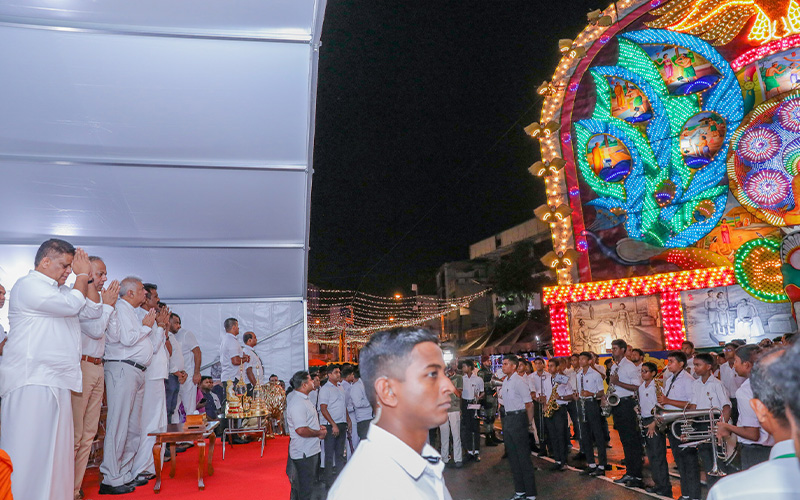
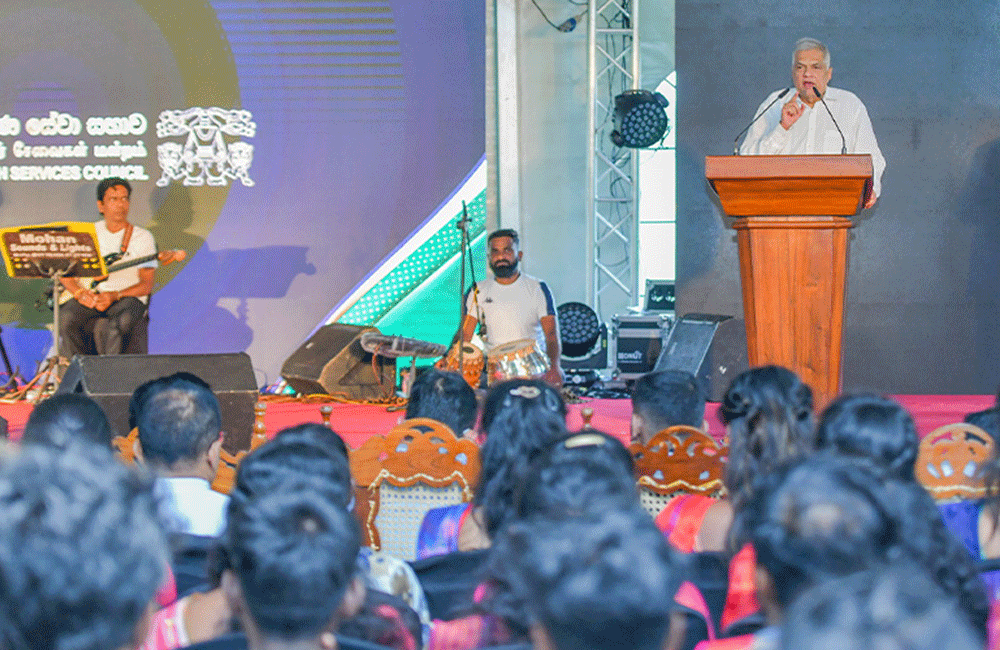
The country will overcome bankruptcy, resolving the youth employment crisis
President Ranil Wickremesinghe announced that the initiative to provide job opportunities for unemployed youth will commence once the country overcomes bankruptcy this year.
The President also mentioned that next year will see the launch of a program aimed at introducing modern agriculture to villages in collaboration with private companies to revitalize the export economy.
President Ranil Wickremesinghe shared these plans at the Jaffna District Youth Conference organized by the National Youth Service Council at Duraiappah Stadium, Jaffna, yesterday (24).
The youth of Jaffna had the opportunity to directly present their needs and concerns to President Ranil Wickremesinghe. Chairman/Director General of the National Youth Service Council Pasindu Gunaratne was also present at the event. Later, the President joined in to watch a cultural performance that showcased the talents of the local youth.
Addressing the event President Ranil Wickremesinghe commented:
It was mentioned today that there is a significant amount of unused land in the Northern Province. This unused land is not only in Jaffna but also in other parts of Sri Lanka. These lands have not been utilized for cultivation. In the distant past, our country’s agriculture was at an export level. During the Anuradhapura period, Sri Lanka exported grain and later, crops such as tea, coffee, cinnamon, and rubber were major exports. However, these export activities have stalled.
Therefore, agriculture should be modernized, and efforts should be made to re-establish an export economy. The youth should also be given the opportunity to engage in agriculture. We aim for the government and private companies to jointly introduce smart agriculture to the villages. This will significantly enhance Sri Lanka’s ability to earn foreign currency. Last week, I joined an observation tour in the Kegalle area, where I witnessed first-hand an entrepreneur utilizing modern agricultural techniques. It is essential to say that the country needs more of such entrepreneurs.
Utilizing 5000 square feet of land through modern agriculture holds the potential for significant income generation. Presently, modern agricultural methods can yield approximately eight metric tons of paddy per hectare, fostering both an export-oriented economy and one resilient against collapse.
Furthermore, the government has prioritized tourism development while also emphasizing renewable energy and energy exports. Regions like Kilinochchi, Mannar and Jaffna boast wind power potential, with plans underway to produce gigawatts of electricity, not just megawatts. Solar panel installations on tanks, particularly Poonaryn and Iranamadu, are part of this initiative, enhancing the Northern Province’s renewable energy capacity.
Moreover, efforts are underway to establish Asia’s largest solar panel battery, capable of generating 700 MW, marking just the initial phase. These endeavours position the North to emerge as Asia’s primary hub for renewable energy production, emphasizing the imperative for expanded electricity generation in the energy sector’s forward trajectory.
Hence, we’ve inked agreements with India’s Adani Company to spearhead renewable energy generation. A dedicated investment zone is slated for development, centred around the Cement Corporation site in Kankasanthurai, with plans for another in the Mankulam area. Safeguarding our seas for the benefit of our fishermen is paramount, alongside modernizing the fishing industry.
Over the past four years, Sri Lanka’s economy endured significant setbacks, causing considerable hardship for its people. Presently, the nation is on the path to recovery from bankruptcy. Post-recovery, concerted efforts will be made to provide employment opportunities for the unemployed youth. The Economic Transformation Law Bill has already been tabled in Parliament, aiming to pivot towards an export-oriented economy. It’s our aspiration to compete with export-based economies like those of Vietnam, Malaysia and Thailand, fostering sustainable economic growth.
Furthermore, in response to your request, I’ve instructed the Chairman of the National Youth Service Council to arrange a grand concert featuring South Indian artists in Jaffna within the coming two months. Our government remains steadfast in its commitment to revitalize the nation’s economy from bankruptcy and uplift the living standards of its people.
Below are some of the questions posed to the President by the youth, and President Ranil Wickremesinghe’s responses:
Q: Hon. President, the shortage of drinking water has become a significant concern in the north. I urge you to provide a solution to address this issue.
A: To address the drinking water shortage in the north, the government has initiated a new project aimed at purifying seawater through desalination. This Desalination Project is scheduled to commence in June. While the Northern Province experiences ample water availability at times, there are severe shortages during certain periods. It’s imperative to devise strategies to manage these fluctuations effectively. It’s worth noting that this issue is not confined to the north alone; similar challenges exist in some southern regions as well. Reports indicate that by 2050, there will be a decrease in rainfall in dry zones while precipitation will increase in wet zones, leading to water abundance. We are actively exploring solutions to mitigate these challenges, recognizing that climate change poses complex problems not only for us but for many nations worldwide.
Q: Hon. President, given the widespread unemployment, could you implement an interest-free loan scheme for self-employment?
A: Unemployment is a pressing issue not only in Jaffna but across the nation. Over the past years, the country has faced economic challenges leading to a lack of job opportunities. However, efforts are underway to revive the economy and overcome bankruptcy by the end of this year. Agreements with the International Monetary Fund (IMF) have been finalized to facilitate this recovery process. As part of our long-term vision, we aim to transition to an export-oriented economy over the next 5-10 years. Legislation to support this transformation will be introduced in Parliament between June and July. Despite the economic downturn experienced last year, once the country emerges from bankruptcy in 2024, we plan to extend concessional loans through the banking system to support self-employment initiatives.
Q: Hon. President, there are reports that Elon Musk, a prominent global entrepreneur, plans to visit Sri Lanka. How will this benefit the youth?
A: I’ve had discussions with Elon Musk regarding the integration of the global ‘Starlink’ network with Sri Lanka. This initiative aims to address the Wi-Fi connectivity issues, particularly in areas outside Colombo. Additionally, we explored the potential of solar energy and other renewable energy sources in our country. I extended an invitation for him to collaborate on significant projects in Sri Lanka. Furthermore, the Telecommunication Regulatory Commission has been tasked with assessing the ‘Starlink’ network, with most of the preliminary work already completed. We are awaiting feedback from the Ministry of Defence to proceed with approval.
The presence of Minister Douglas Devananda, Northern Province Governor Mrs. P. S. M. Charles, Chairman/Director General of the National Youth Service Council Pasindu Gunaratne, and numerous young individuals further enriched the discussion.
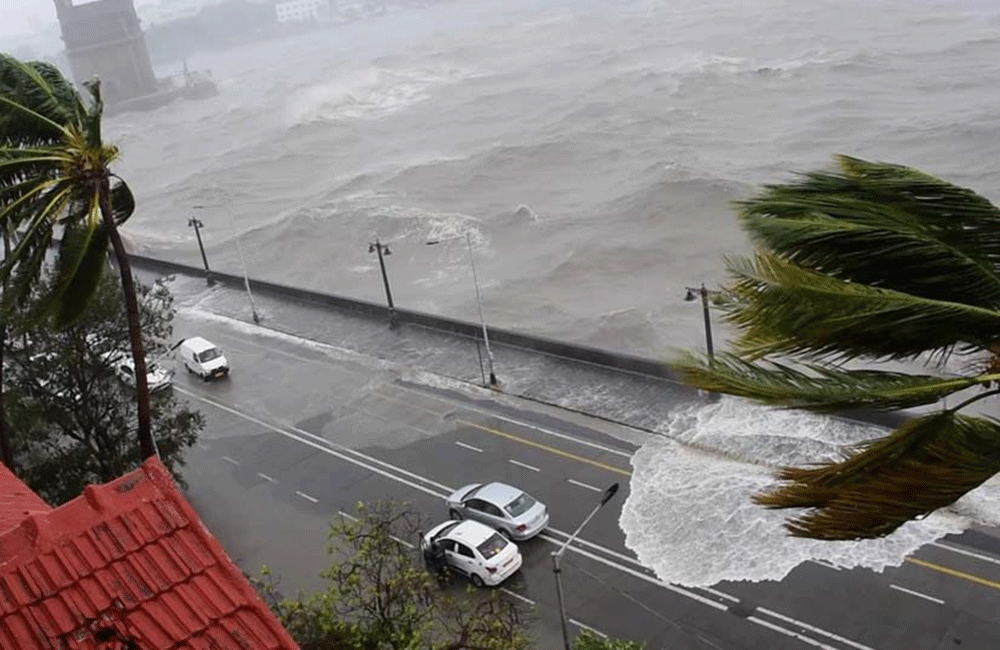
Warning issued for fishing and naval communities over cyclonic storm
The Department of Meteorology has issued a ‘red’ warning for strong winds and rough seas for naval and fishermen communities in the deep-sea areas in the South-eastern Arabian Sea and in the Bay of Bengal.
The ‘red’ alert states that a low-pressure area over south west Bay of Bengal has intensified into a Depression and lay centered near 15.0°N and 88.4°E at 05.30 a.m. of today (24 May).
It is likely to continue to move northeastwards and concentrate into a cyclonic storm over east-central Bay of Bengal by 05.30 a.m. of 25th may, 2024. Thereafter, it is likely to move northwards, intensify further into a severe cyclonic storm over same region by 11.30 p.m. of 25th May 2024, the advisory said.
Very strong winds 60-70 kmph, accompanied with heavy rainfalls and very rough seas are likely over the sea areas around the country and over the South-eastern Arabian Sea areas and Bay of Bengal.
Naval and fishing communities are advised not to venture into the sea areas marked by ‘RED’ color on the map below until further notice.
Those who are out at aforementioned sea regions are advised to return to coasts or moved safer areas immediately.
Naval and fishing communities are also requested to be attentive to future forecasts issued by the Department of Meteorology in this regard.
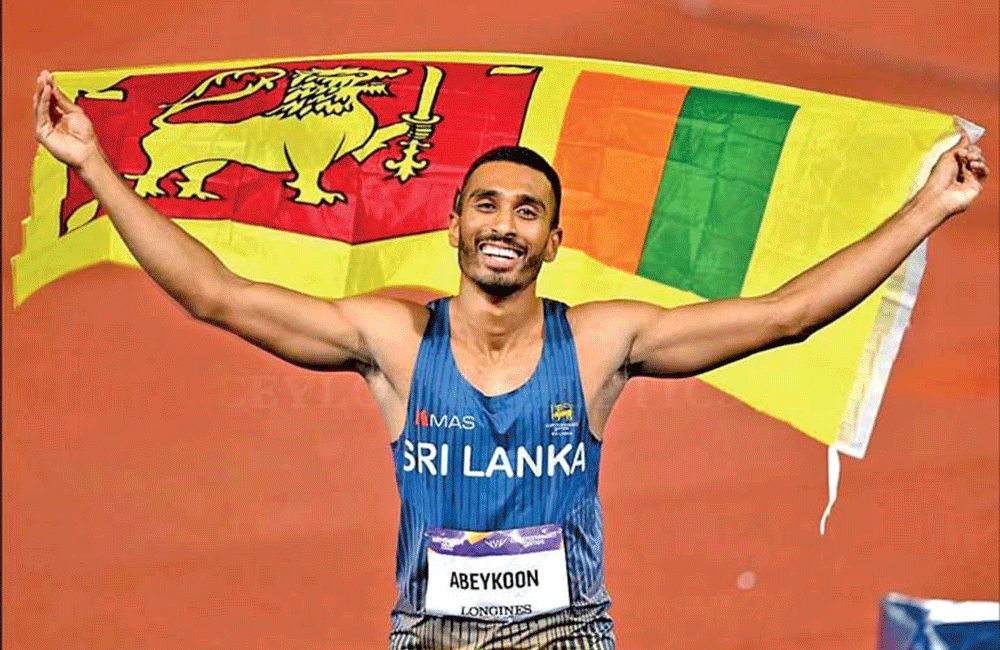
Yupun Abeykoon wins at Anhalt Athletic Championship
Sri Lankan sprinter Yupun Abeykoon secured another victory in the men's 100m race at the Anhalt Athletics Championship in Germany, clocking a time of 10.16 seconds.
This win marks his fourth consecutive title at the event, having previously triumphed in 2020, 2021, and 2022.
While 10.16 seconds is not his personal best for the season (previously achieved at 10.15 seconds in the preliminary round), it demonstrates his continued dominance in the 100m at the Anhalt Athletics Championship.
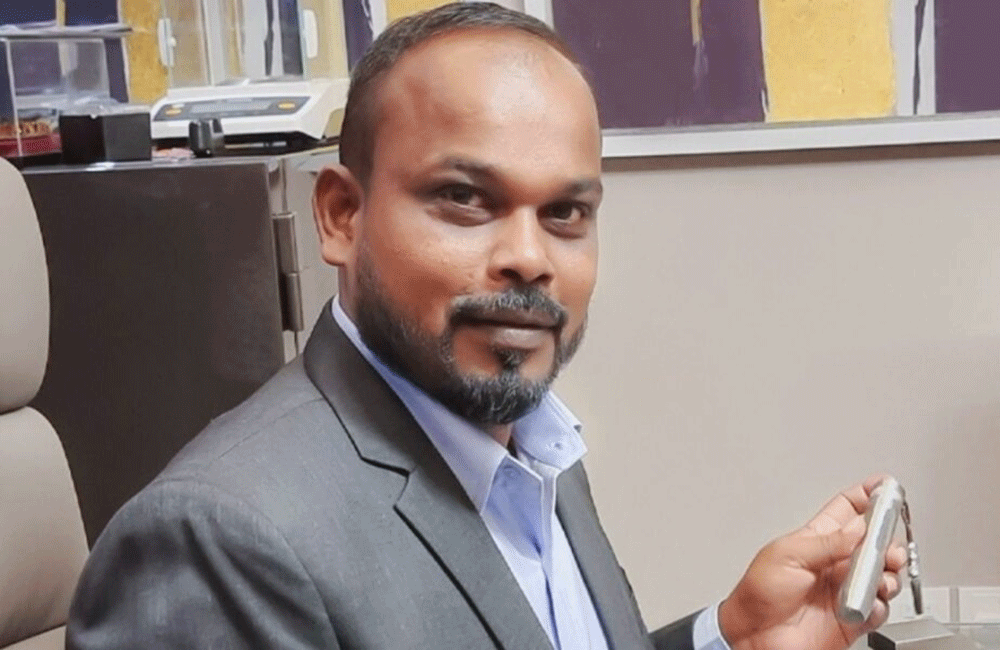
Aura Lanka chairman Viranjith Thambugala arrested
The Chairman of Aura Lanka, businessman Viranjith Thambugala, has been arrested by police over allegations of financial fraud.
He has been remanded until May 27 after being produced before the Colombo Magistrate’s Court.
Thanbugala is the Chairman of Aura Lanka Group of Companies and the former owner of the ‘Dambulla Aura’ team in the Lanka Premier League (LPL).
Page 204 of 681